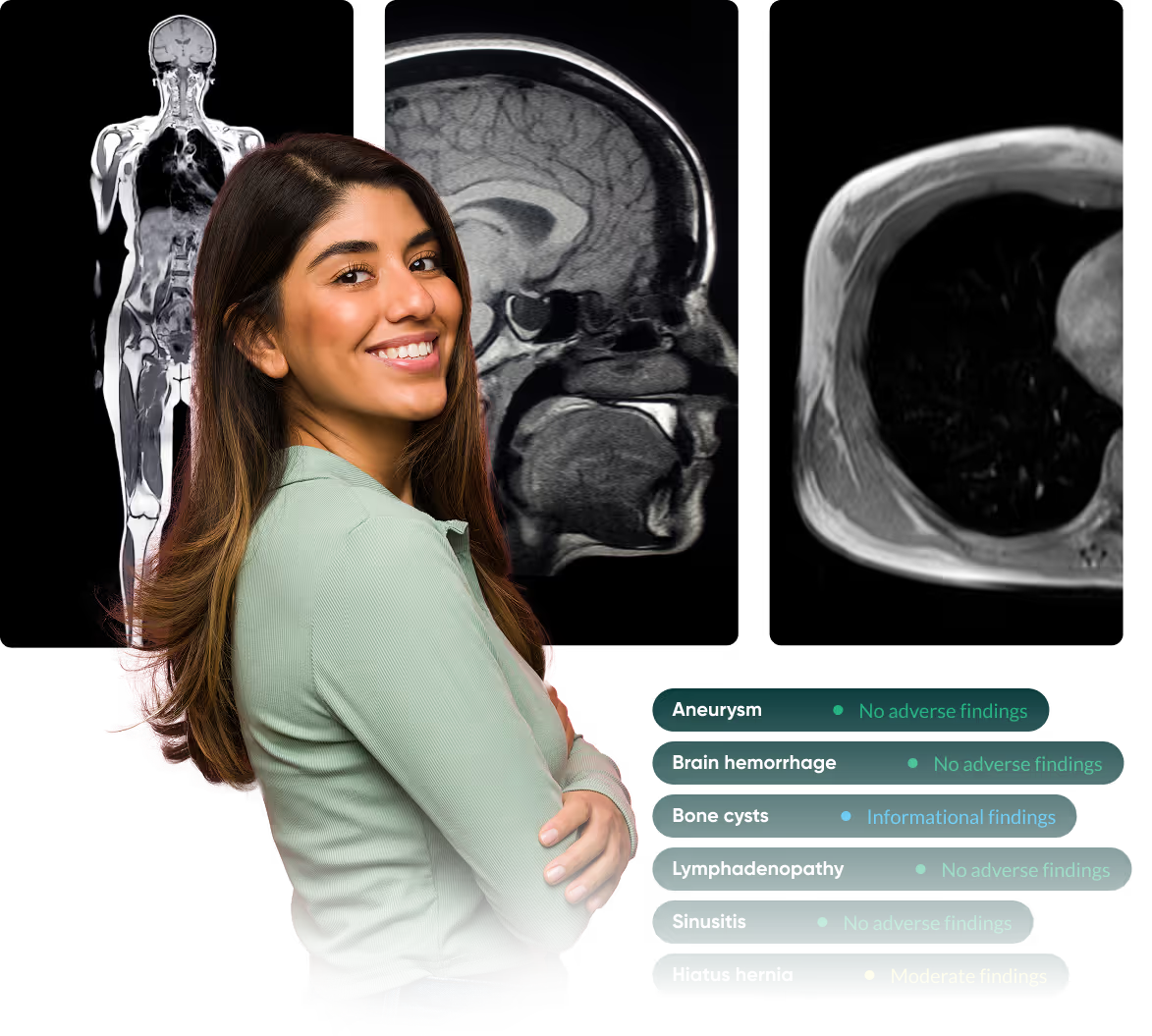Endometriosis is common—but often missed. Prenuvo can help detect it early.

Endometriosis affects an estimated 1 in 10 women of reproductive age 1. It occurs when tissue similar to the lining of the uterus grows outside of it, leading to pain, inflammation, and sometimes infertility. Unfortunately, it often takes years to diagnose—leaving many women suffering in silence1.
Prenuvo advantage
Our whole-body MRI provides a safe, non-invasive way to help identify abnormal tissues and changes related to endometriosis and other gynecologic conditions—without radiation, contrast dye, or invasive surgery.
MRI detection of endometriosis
Our advanced MRI technology can identify endometriosis non-invasively, providing clear visualization that helps guide diagnosis and treatment decisions.

Normal MRI Scan
Healthy ovarian tissue with normal structure and appearance

MRI with endometrioma
Clear visualization of endometriotic cyst that can be detected non-invasively.
Understanding Endometriosis
Endometriosis happens when tissue that normally lines the inside of the uterus (endometrium) is found outside of it—often on the ovaries, fallopian tubes, or pelvic lining. Each month, this tissue behaves like normal uterine lining: thickening, breaking down, and bleeding. But because it’s outside the uterus, the blood has nowhere to go, causing irritation, scar tissue, and adhesions.
Traditional diagnosis can be difficult. Symptoms overlap with other conditions, and the “gold standard” diagnostic tool—laparoscopy—is a surgical procedure. Many patients wait 7–10 years on average before receiving a confirmed diagnosis2.
Prenuvo’s MRI can identify abnormal tissue and changes related to endometriosis non-invasively, providing valuable insights to support an earlier diagnosis.
Warning signs of endometriosis
Endometriosis symptoms can vary widely and sometimes mimic other conditions, making it easy to overlook.
Common/early signs:
- Painful periods (cramping that worsens over time)
- Pelvic pain between periods
- Pain with sex
- Heavy menstrual bleeding or spotting
More advanced/serious signs:
- Pain with bowel movements or urination, especially during periods
- Chronic lower back or abdominal pain
- Infertility or difficulty conceiving
- Fatigue, diarrhea, constipation, or bloating that worsens during menstruation



Take action today
Book your scan or schedule an intro call and we’ll be in touch.
How endometriosis progresses
Early stage (minimal to mild)
- Typical age: Usually diagnosed in women in their 20s–30s, though symptoms can start in teens 3
- Description: Small patches of tissue appear outside the uterus; may cause mild to moderate pelvic pain.
- Why early detection matters: Early identification allows for pain management, fertility planning, and treatment before extensive scar tissue develops(3)
Physical changes: Subtle lesions or cysts, sometimes only visible with imaging.
Risk factors: Early menarche (first period), short menstrual cycles, heavy bleeding, family history.
Middle stage (moderate to severe)
- Typical age: Symptoms often worsen with age if untreated.
- Description: Larger, deeper lesions, adhesions, and ovarian cysts (endometriomas).
- Symptoms to watch: More intense pelvic pain, pain with daily activities, worsening infertility4
Why detection matters: Identifying disease earlier can prevent years of suffering, protect fertility, and guide appropriate medical or surgical interventions
Know your risk
Factors that increase risk of endometriosis include:
- Family history (mother, sister, or aunt with endometriosis)
- Early onset of menstruation or short monthly cycles
- Heavy or prolonged periods
- Low body mass index (BMI)
- Never having given birth
Next Step: Even if you don’t have all the risk factors, chronic pelvic pain or worsening menstrual symptoms should not be ignored. Prenuvo’s MRI can help provide clarity without invasive procedures.
Important facts about endometriosis
- Delayed diagnosis is common. Many women wait up to a decade for answers, often after seeing multiple doctors.
- Not just “bad periods.” Endometriosis can impact fertility, daily function, and long-term quality of life.
- Imaging matters. While laparoscopy remains the gold standard, advanced MRI can identify many cases and help guide diagnosis and treatment4
- Earlier detection = better outcomes. Recognizing and managing endometriosis earlier can reduce pain, improve fertility options, and preserve long-term health.
Citations
- Peterson, K. (2024, December 6). What doctors wish patients knew about endometriosis. American Medical Association. Retrieved September 9, 2025, from https://www.ama-assn.org/delivering-care/population-care/what-doctors-wish-patients-knew-about-endometriosis
- De Corte, P. (2024). Time to diagnose endometriosis: Current status, challenges and regional characteristics—a systematic literature review. PMC. Retrieved September 9, 2025, from https://pmc.ncbi.nlm.nih.gov/articles/PMC11625652/
- Editorial Team. (2022, March). When can endometriosis develop? Endometriosis.net. Retrieved September 9, 2025, from https://endometriosis.net/age-start-for-women
- Crump, J., Suker, A., & White, L. (2024). Endometriosis: A review of recent evidence and guidelines. Australian Journal of General Practice, 53(1–2), 11–18. https://doi.org/10.31128/AJGP/04-23-6805



Frequently asked questions
What sets us prominently apart from other “Full Body Scan” services is that we are led by a unique synergistic team of pioneers in clinical radiology and MRI-technology. Specifically, we have innovated a custom Whole-Body MRI (WB-MRI) protocol optimizing for maximal utility in the preventive healthcare screening setting.
In contrast to some other Full Body Scan approaches, which may involve components from other modalities (such as CT of the chest) and/or separate segmental MRI exams which might not get holistically evaluated or which also may not fully include some intervening anatomical regions, our protocol relies solely on MRI-techniques alone. We utilize dedicated multiparametric WB-MRI techniques in conjunction with carefully selected relevant high-yield organ-specific sequences obtained in a single rapid image acquisition procedure. This enables a convenient, comfortable experience for the patient, as well as superior holistic “Full Body Scan” radiological interpretation capabilities.
In developing this protocol and the specialized techniques involved, our team has emphasized image acquisition speed without comprising comprehensiveness or diagnostic quality of the obtained images, which is the typical tradeoff in MRI when attempting to image faster and with larger fields of view. To maximize the amount of clinically valuable proactive information from the WB-MRI scan – such as maximizing the overall sensitivity and specificity of the scan (thereby minimizing false positive and false negative rates) for conditions like suspected cancer findings, brain aneurysm, and fatty liver— it is essential to utilize a comprehensive multiparametric MRI approach.
Similar to utilizing different filters on a camera lens to capture different color properties of a scene into a photograph, multiparametric MRI acts as a filter for capturing different properties of the tissue being imaged. Beyond simply acquiring images that in sum cover most of your body’s anatomy to simply be able to offer a “Full Body Scan” product, we take particular pride in the quality and comprehensiveness of our images from our Prenuvo WB-MRI scan protocol for their maximal diagnostic and clinical utility in the screening setting. Additionally, our radiologists are uniquely specialized in the science and clinical art of whole-body screening radiology utilizing WB-MRI — which involves taking into account complexities from the individual patient’s perspective, the referring or treating physician’s perspective, and the healthcare system’s perspective. Enriched by this special clinical experience, our unique specialized radiology practice has grown into a completely patient-centered radiological WB-MRI screening service (adept at handling and risk-stratifying the wide spectrum of possible findings that can be encountered on screening WB-MRI). Due to our emphasis on diagnostic quality, clinical utility, and patient experience, this service has been very well-received by our proactive-minded patients and referring providers.
Prenuvo scans do not expose you to harmful ionizing radiation that other imaging methods (X-rays, CT scans, PET scans) use. Prenuvo scans also don't use intravascular contrast dyes.
No detrimental effects have been shown to have occurred due to having an MRI when pregnant. There is, however, a risk of causing hearing problems in the fetus due to the sounds that occur throughout MRI imaging. MRI can also increase the amniotic fluid temperature. Therefore, we avoid performing screening MRI when you are pregnant.
Included with every scan is a detailed physician report, associated key images, and links to the full “DICOM” image series that patients can share with their providers which gives every patient the same visibility into their images as our radiologists. Also included with every scan is a complementary consultation with a nurse practitioner specialized in reviewing the radiologist report from the WB-RMI and explaining what each area means for the patient. They are able to review your patient’s main findings and answer any additional questions. While we don’t directly connect or refer our patients to further imaging or tests, our reports provide suggestions on who to follow up with and the next steps.
If there are urgent findings, a licensed provider directly contacts the patient and recommends timely and appropriate follow up care depending on the finding.
If you have any questions or need more detailed information, feel free to reach out to us for support at practitioners@prenuvo.com.
For US clinics, we do not require a referral. For Canadian clinics, you will need a referral.
If you require, we can arrange a referral from an independent medical practitioner at no cost to you. It may seem like an unnecessary requirement, but it exists to look after you in the event there is a serious medical finding. A medical practitioner can additionally assist you in understanding and contextualizing the findings in your Prenuvo scan report.